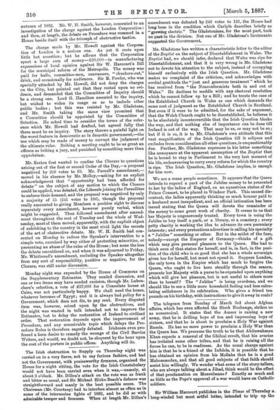The charge made by Mr. Howell against the Corpora- tion
of London is a serious one. As yet it rests upon little but assertion; but he affirms that the Corporation spent a large sum of money-220,000—in manufacturing expressions of local opinion against Sir W. Harcourt's Bill for the municipal reform of the Metropolis. The money was paid for halls, committee-men, canvassers, " chuckers-ont," drink, and occasionally for audiences. Sir R. Fowler, who was specially attacked by Mr. Howell, did not deny the charges on the City, but pointed out that they rested upon no evi- dence, and demanded that the Committee of Inquiry should be a strong one. Lord G. Hamilton assented to the inquiry, but wished to widen its range so as to include other public bodies ; but this was resisted by Mr. Gladstone, and Mr. Smith taking the same view promised that a Committee should be appointed by the Committee of Selection. He asked time to consider the terms of the refer- ence which Mr. Howell had drafted, but agreed fully that there must be an inquiry. The story throws a painful light on the worst feature in democratic as in despotic government,—the use which may be made of money to corrupt the judgment of the ultimate ruler. Bribing a meeting ought to be as great an offence as bribing a jury, and punished by something more than opprobrium.


































 Previous page
Previous page